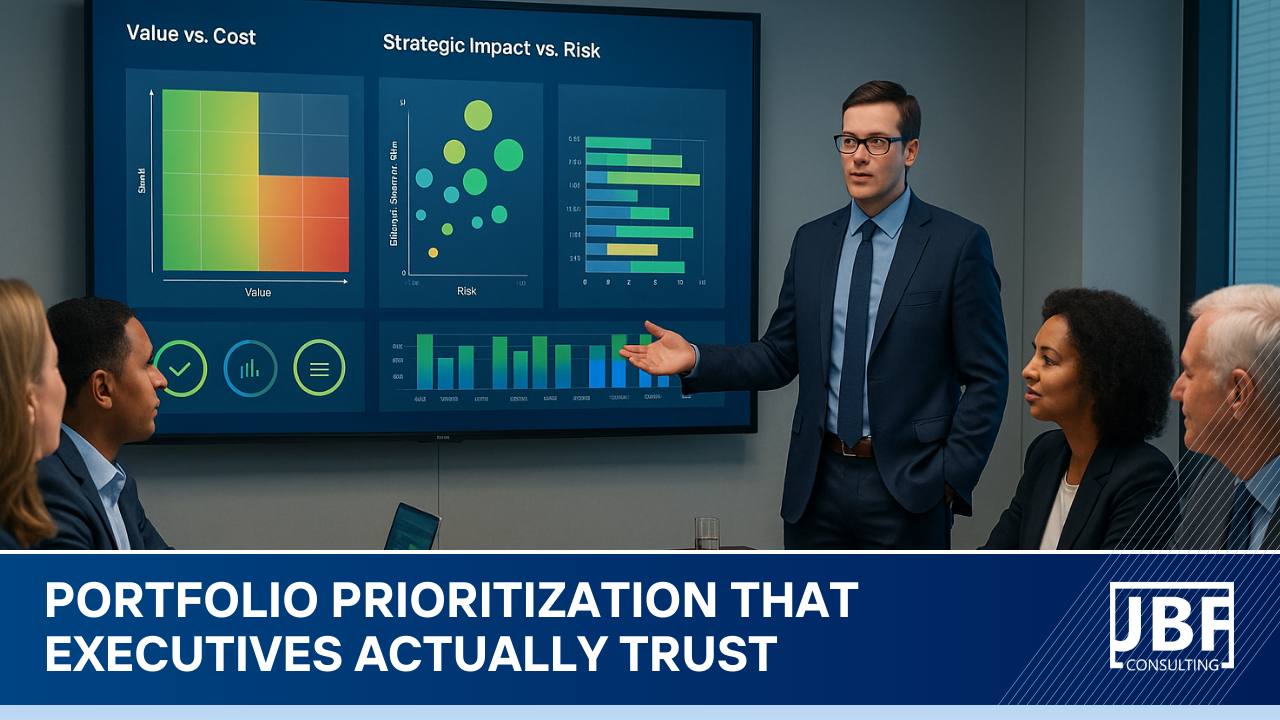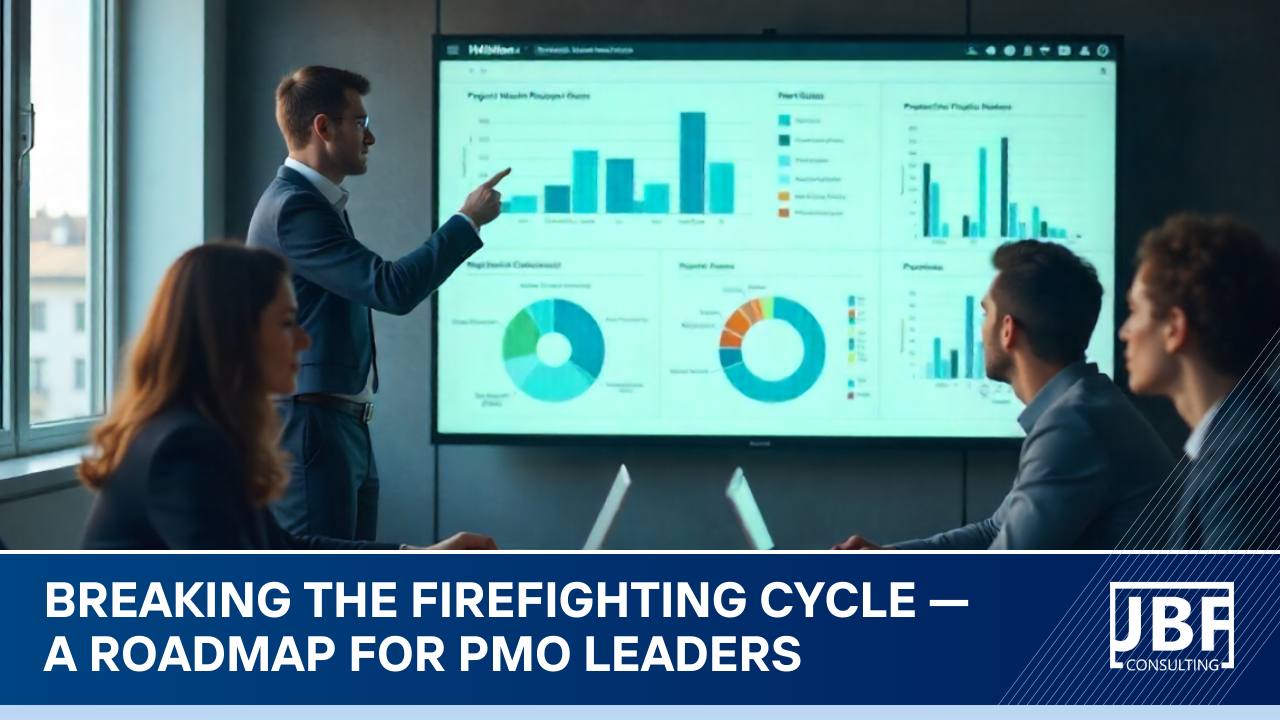Your staff PM team may be more expensive than you think
Project management is a critical function for businesses running complex initiatives. While some organizations believe hiring in-house PMs ensures continuity and deeper knowledge retention, many others have discovered the strategic and financial benefits of working with external consultants.
This post explores why consultant project managers (PMs) are an excellent choice and deliver a positive return on investment (ROI) compared to full-time staff PMs. We’ll also address some common myths and misconceptions about in-house PMs and demonstrate the measurable value that consultant PMs can bring to your organization.
Common Myths about In-house PMs vs. Consultants
Myth 1: “Hiring Staff PMs Is Cheaper in the Long Run”
Belief: Salaries appear cheaper than consulting fees at first glance.
Logic: Leaders assume that paying a fixed salary with benefits is more economical than engaging a consultant at a higher hourly or daily rate.
Challenge: This perspective overlooks hidden costs associated with employing full-time staff. Beyond base salaries and benefits, there are substantial costs related to management time and oversight, including
- Hiring and onboarding: Time and resources spent recruiting, interviewing, and onboarding new staff.
- Training and development: Managers must coach employees, set performance objectives, and develop individual growth plans.
- Oversight and performance management: Leaders need to monitor progress, conduct performance reviews, and provide regular feedback.
- Vacation, sick leave, and downtime management: Staff require time off, which must be managed to avoid project delays.
- Team-building activities: Time and effort must be spent organizing team-building exercises to keep morale and collaboration high.
- Succession planning and turnover management: If staff leave, managers must restart the hiring process and manage the impact of turnover on project timelines.
Example:
Staff PM Cost Breakdown:
- CAD 120,000 base salary + CAD 36,000 benefits = CAD 156,000.
- Add management time (estimated 20% of salary) = CAD 24,000.
- Add Recruitment and Onboarding = CAD 10,000
- Add vacation, sick leave and downtime = CAD 10,000.
- Total cost of one staff PM: ~CAD 200,000+ annually.
- Impact: Staff PMs consume management resources even when they aren’t actively working on critical tasks, while consultants only require minimal oversight—focusing entirely on deliverables and milestones. This makes consultants not only more cost-efficient but also less burdensome on leadership.
Myth 2: “We Need to Retain Project Knowledge In-house”
Belief: In-house PMs will accumulate knowledge about the organization’s processes, systems, and people, making them valuable assets for future projects.
Logic: Leaders assume that keeping PMs in-house ensures knowledge continuity and reduces risks, as these employees will carry lessons learned from one project to another.
Challenge: This assumption overlooks key realities about how knowledge flows within organizations:
- Staff PMs often seek variety. They prefer to move between different projects to grow their skills, rather than continuously managing the same types of initiatives. This limits the depth of subject-matter expertise they build over time.
- Operational responsibility lies elsewhere. Even with long-term employees, the business or operations teams—not the PM—are responsible for maintaining and sustaining the solution once the project concludes. PMs are generally not involved in day-to-day operations, meaning knowledge transfer to these teams is critical regardless of the PM’s employment type.
How Consultants Address This Challenge:
- Structured Knowledge Transfer: Consultant PMs create detailed “as-built” documentation and knowledge-sharing frameworks, ensuring all relevant information is passed on to the business or operations team.
- Training and Handover Sessions: At the end of the project, consultants train internal teams and ensure a smooth handoff of responsibilities, minimizing risks of lost knowledge.
- Focused Expertise for Repeat Projects: Many consultants specialize in specific types of projects (e.g., Salesforce implementations, system migrations), meaning they bring deeper experience than an in-house PM rotating between diverse initiatives.
Myth 3: “Staff PMs Will Have a Better Cultural Fit to Our Organization”
- Belief: Staff PMs will develop closer relationships with the organization, teams, and stakeholders, resulting in better collaboration.
- Logic: Leaders assume that employees will have more emotional investment in the company’s long-term success because they are part of the organizational fabric.
- Challenge: However, consultants are often just as invested in success because their reputation and future engagements depend on positive outcomes. Consultants can also offer a fresh perspective without getting bogged down in internal politics.
Myth 4: “Consultants Won’t Understand Our Company’s Strategy”
- Belief: Full-time PMs are better positioned to align projects with long-term business goals.
- Logic: Organizations assume that a long-term employee will have a deeper understanding of company strategy and ongoing initiatives.
- Challenge: While staff PMs may understand the strategy, they may also struggle to keep up with the latest industry trends and best practices. Consultants bring cutting-edge knowledge and experience from other organizations and industries, enhancing strategic alignment.
Myth 5: “Staff PM Will Develop a Stronger Relationship With Our Team”
- Belief: A staff PM has more time to develop trust and rapport with internal stakeholders, leading to smoother collaboration.
- Logic: Leaders assume that stakeholders will be more responsive and cooperative with someone they know well, rather than an external consultant.
- Challenge: However, experienced consultants quickly build stakeholder trust by focusing on clear communication, results, and accountability. They are often more objective and neutral in their relationships, which can improve stakeholder dynamics.
Myth 6: “Staff PM Will Be More Loyal to Our Company”
- Belief: Staff PMs will stay with the organization for the long term, creating a sense of stability and reducing turnover.
- Logic: Leaders assume that permanent employees are a more stable resource for complex, multi-year initiatives.
- Challenge: In reality, employee turnover is common, even for PM roles, and training new staff members takes time. Consultants, on the other hand, are engaged specifically for the project lifecycle, ensuring continuity until the project is complete.
Myth 7: “Staff PM Will Require Less Onboarding Time than a Consultant”
- Belief: Staff PMs, especially if promoted from within, don’t need as much time to learn the internal processes and systems.
- Logic: Leaders assume that onboarding an external consultant takes longer since they need time to understand the company’s operations.
- Challenge: However, experienced consultants are skilled at adapting quickly and often come with industry expertise that reduces the overall learning curve. They also leverage existing project management frameworks to start adding value right away.
Myth 8: “Staff PM Will Anticipate Risks More Efficiently as They Understand Our Organization Better than Consultants”
- Belief: Having PMs in-house reduces risks since they know the company’s history, compliance requirements, and project pitfalls.
- Logic: Leaders assume that in-house PMs are better prepared to anticipate risks unique to the organization.
- Challenge: Consultants bring risk management expertise from different industries, making them highly effective at identifying and mitigating risks proactively. They often bring structured frameworks and risk mitigation plans that internal staff may overlook.
ROI Comparison – Consultant PMs vs. Staff PMs
If the points above were not sufficient to convince you that a consultant PM can be a great addition to your team, then let’s see how it works financially:
Cost Comparison Example: 12-Month Project with 1,500 PM Hours
Here is a side-by-side breakdown of the true costs involved in hiring a staff PM vs. a consultant PM for a 12-month initiative requiring 1,500 hours of project management effort.

Insight: Although the consultant PM’s total cost appears higher based on hourly rates alone, the staff PM’s true cost, including recruitment, management time, and downtime, can easily exceed expectations.
Now, let’s add some typical scenarios that typically occur on projects:

ROI Summary: Why Consultants Are the Smarter Choice
- Consultant Cost: CAD 187,500
- Staff PM Cost (All-In): CAD 200,000+
- Savings from Avoiding Delays: CAD 387,500
Net ROI Calculation
If the consultant PM avoids delays and reduces management overhead, the organization’s total ROI is:
1. Total Cost of Consultant: CAD 187,500
2. Total Savings: CAD 387,500 + CAD 12,500 = CAD 400,00 (delays + labour cost savings) =
Net ROI:
[Savings (CAD 400,000) – Consultant Cost (CAD 187,500)] / Consultant Cost (CAD 187,500) = 113% Positive ROI
By avoiding costly delays, reducing management overhead, and ensuring faster and more efficient project execution, consultant PMs deliver a significant positive ROI compared to staff PMs. In our scenario, the organization achieved a net ROI of CAD 113% by engaging a consultant PM instead of relying on an in-house resource.
This isn’t just about numbers—it’s about value. Consultant PMs bring expertise, flexibility, and accountability that are essential for complex projects. The question isn’t “Can we afford consultants?”—it’s “Can we afford not to hire them?”
Are you ready to transform the way you manage projects?
Explore how JBF Consulting can help your business thrive with our expert PM consulting services.
Schedule a free consultation today and discover how we can make a difference for your next project!






